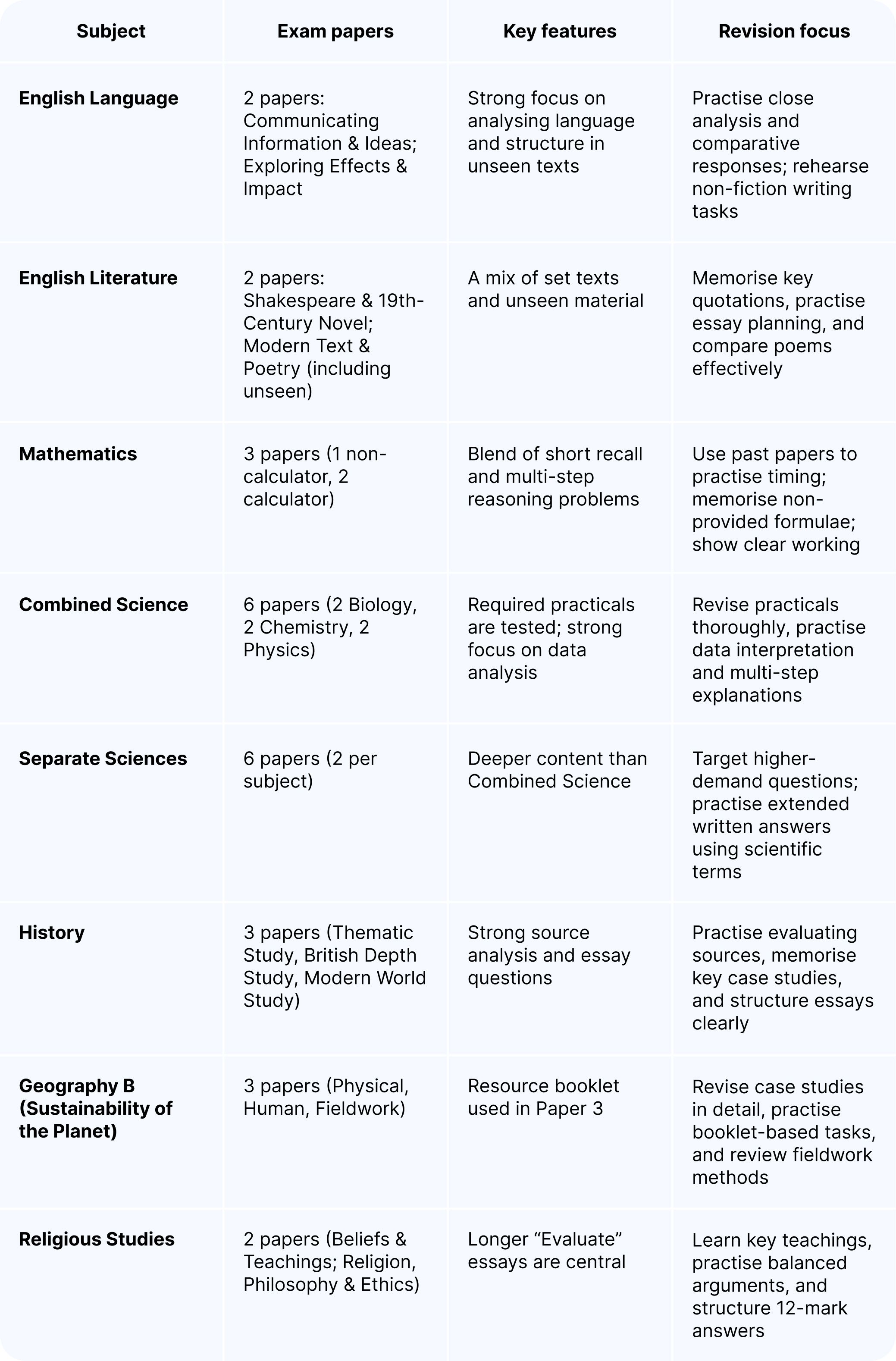Contents
Preparing for OCR GCSE exams can seem like a daunting task, but with the right strategies, revision can become structured and effective. This guide covers practical approaches, subject-specific tips, and exam techniques to help students feel confident on exam day.
What this post covers:
Why OCR GCSE exam preparation matters
Key features of OCR GCSE assessments
Subject-by-subject exam structure and revision focus
General revision strategies
Subject-specific OCR revision tips
Effective exam technique
Final advice for parents and students
Why OCR GCSE exam preparation matters
OCR (Oxford, Cambridge, and RSA) is one of the main exam boards in the UK. Its specifications test knowledge and skills such as analysis, evaluation, and application in real-world contexts.
OCR often includes structured, source-based, and extended response questions, so careful planning helps students manage time, thoroughly cover the syllabus, and confidently approach each paper.
Key features of OCR GCSE exams
Range of exam papers: Most subjects are split across two or three papers with different focuses.
Assessment objectives (AOs): OCR exams are carefully weighted to assess knowledge recall, explanation, analysis, and evaluation.
Practical and coursework elements (NEA): In subjects like Art, Design and Technology, and Sciences, non-exam assessment (NEA) is an important part of final grades.
Source-based questions: Humanities subjects often use sources or case studies to test students’ ability to analyse and evaluate information.
Tiered questions: Many papers increase in demand with higher-mark questions requiring extended, structured answers.
Subject-by-subject exam structure and revision focus
Each OCR GCSE subject has its own exam format and priorities. Understanding how the papers are structured and what examiners look for makes it easier to target revision effectively.
The table below highlights the key features of each subject and where to focus your preparation.

General revision strategies
A good revision plan for OCR GCSE exams should combine learning the content with practising using it in different situations. Because OCR exams often ask you to analyse sources, write extended answers, and explain your thinking, your revision should prepare you for those challenges.
Here are some strategies that can really help:
1. Use the assessment objectives as a guide
OCR assessment objectives explain exactly what skills each subject tests, such as recalling facts, explaining processes, or evaluating ideas.
Think of these as a checklist: can you explain a topic clearly? Can you weigh up how important it is? This helps ensure you’re practising the right skills, not just memorising.
2. Practise with sources and data
In subjects like History, Geography, and Science, OCR often gives you a source or data to analyse. To get ready, try quick daily exercises, for example, look at a graph and explain what it shows, or read a short source and say whether it’s reliable. Small steps like this make the exam tasks feel easier.
3. Use practice papers and examiner reports
OCR past papers are great for getting used to the exam style.
Use alongside OCR’s examiner reports that explain what students often get wrong and what examiners look for in good answers. Reading these tips can help you avoid common mistakes.
4. Get used to timed writing
Many OCR subjects, like History and Religious Studies, include longer essay-style questions. Practising planning and writing under a 10–15 minute timer can help you better organise your thoughts and write clearly.
To help you prepare for writing essays, read our blog on How to use the PEEL technique to write an effective essay, which includes some great tips to help you get started!
5. Balance coursework (NEA) with revision
In some subjects, like Art, Drama, or Design and Technology, coursework (non-exam assessment, or NEA) counts for a big part of your grade. Make sure you leave time for both, don’t spend so much time on revision that your coursework suffers, and don’t forget your exams while finishing your projects.
6. Connect theory to practice
OCR likes to test how well you can apply knowledge. For example, in Science you might be asked about required practicals, or in Geography about fieldwork. Go back over these and practise linking the theory to the practical skills you used in class.
7. Revise by themes, not just single topics
OCR questions often ask you to connect ideas. For example, in History you might need to link events across time, or in Religious Studies compare different viewpoints. Mind maps or theme-based essay plans are great for this.
8. Try teaching it to someone else
One of the best ways to check if you really understand a topic is to explain it to someone else, a parent, a friend, or even a younger sibling. If you can explain it simply and clearly, it shows you’ve mastered it.
Subject-specific OCR revision tips
English
Practise analysing how writers use language, form, and structure in unseen passages.
Rehearse non-fiction writing tasks such as articles and speeches with a clear tone and purpose.
For English Literature, use quotation flashcards and practise linking context to themes.
Mathematics
OCR Maths often blends short recall questions with complex multi-step reasoning.
Show all working for method marks.
Memorise formulae not provided on the sheet.
Sciences (Biology, Chemistry, Physics)
Learn required practicals thoroughly, as exam papers test methods and evaluation.
Practise interpreting graphs, tables, and data sets.
Write extended responses using precise scientific vocabulary.
Humanities (History, Geography, Religious Studies)
History exams include both source analysis and essay-style questions. Practise evaluating reliability and significance.
Geography papers require strong case study knowledge. Revise facts and practise decision-making tasks from the resource booklet.
In Religious Studies, practice 12-mark “Evaluate” essays, balancing religious and non-religious viewpoints.
Arts and practical subjects
Keep coursework portfolios updated, as NEAs form a large proportion of marks.
In drama and music, rehearse applying technical language to set pieces.
Record rehearsal notes and reflections; self-evaluation is rewarded in OCR’s marking.
Effective exam technique
Read questions carefully - OCR questions often escalate in difficulty. Match answers to the number of marks available.
Plan extended responses - In English, History, or Religious Studies, plan essays before writing. Clear structure earns higher marks.
Manage time across papers - Avoid spending too long on lower-mark questions. Keep track and return to them if time allows.
Use sources and data effectively - OCR papers strongly emphasise interpreting and evaluating source material, particularly in History and Geography. Marks are awarded for quoting sources and analysing their reliability, usefulness, and relevance.
Check calculations and arguments - Recheck units, steps, and clarity of reasoning. Small corrections can make a big difference.
Final advice for parents and students
The run-up to OCR GCSE exams can feel intense, but success comes from steady preparation and the right support.
For parents, one of the most valuable roles is to provide a calm, encouraging environment that helps learning without adding pressure. Showing interest in progress, keeping an eye on timetables, and ensuring there’s a balance between revision and rest all make a difference.
For students, consistency is key: starting revision early, revisiting topics regularly, and using OCR practice papers and examiner reports to understand the exam style all help build confidence. With steady effort, supportive routines, and a balanced approach, students can walk into their OCR GCSE exams feeling confident and prepared.
Don’t miss Atom’s GCSE giveaway!

Six months. Six epic prizes. Six chances to make the GCSE season unforgettable.
We’re launching Atom for GCSE prep in 2026, and to celebrate, over the next six months, we’re giving away thousands of pounds worth of prizes to help your child level up their GCSE revision.
Here’s a taste of what’s up for grabs:
The latest Apple tech, including an iPad Air, Vision Pro and more
Festival tickets for Boardmasters and Reading 2026
Europe interrail passes and £1,000 spending money
…and that’s just a few of the amazing prizes available.
Our first two winners have already taken home incredible prizes! Find out who they are and what they won in our latest giveaway update and keep an eye out for news of our November winner.
It’s free to join. UK only. Full T&Cs apply.
Contents
